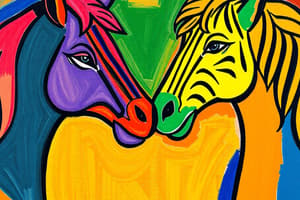Podcast
Questions and Answers
What is learning?
What is learning?
Process of acquiring through experience new and relatively enduring information or behaviors
One way we _____ is by association.
One way we _____ is by association.
learn
What is associative learning?
What is associative learning?
Learning that certain events occur together.
________ work also provided a basis for Watson's ideas.
________ work also provided a basis for Watson's ideas.
Signup and view all the answers
_______ applied classical conditioning principles to demonstrate how specific fears might be conditioned.
_______ applied classical conditioning principles to demonstrate how specific fears might be conditioned.
Signup and view all the answers
_____ boasted that he could take any healthy infant and train for any career specialization.
_____ boasted that he could take any healthy infant and train for any career specialization.
Signup and view all the answers
What have been some applications of Pavlov's work to human health and well-being?
What have been some applications of Pavlov's work to human health and well-being?
Signup and view all the answers
Why does Pavlov's work remain so important?
Why does Pavlov's work remain so important?
Signup and view all the answers
What did Pavlov demonstrate about generalization?
What did Pavlov demonstrate about generalization?
Signup and view all the answers
What is generalization in classical conditioning?
What is generalization in classical conditioning?
Signup and view all the answers
What is discrimination in classical conditioning?
What is discrimination in classical conditioning?
Signup and view all the answers
What is acquisition in classical conditioning?
What is acquisition in classical conditioning?
Signup and view all the answers
What is extinction in classical conditioning?
What is extinction in classical conditioning?
Signup and view all the answers
What is spontaneous recovery?
What is spontaneous recovery?
Signup and view all the answers
What is a conditioned response?
What is a conditioned response?
Signup and view all the answers
What is a conditioned stimulus?
What is a conditioned stimulus?
Signup and view all the answers
For three decades, _________ research demonstrated associative learning.
For three decades, _________ research demonstrated associative learning.
Signup and view all the answers
What is a neutral stimulus?
What is a neutral stimulus?
Signup and view all the answers
What is an unconditioned response?
What is an unconditioned response?
Signup and view all the answers
Study Notes
Basic Learning Concepts
- Learning involves acquiring new, enduring information or behaviors through experience.
- Associative learning connects events, often involving stimuli and responses.
Classical Conditioning
- Pavlov's work laid the foundation for understanding how human emotions and behaviors arise from conditioned responses.
- Watson utilized classical conditioning principles in his "Little Albert" experiment to illustrate how specific fears can be learned.
Application of Pavlov's Principles
- Pavlov's principles are applied in fields such as motivation, therapy, and health psychology.
- Techniques for addiction treatment include counseling patients to avoid triggers linked to cravings.
- Pairing tastes with immunological responses can condition the immune system to react to specific tastes alone.
Importance of Pavlov’s Work
- Classical conditioning is recognized as a fundamental learning process applicable across species.
- Pavlov demonstrated that learning processes can be studied objectively, enhancing our understanding of behavior.
Generalization and Discrimination
- Generalization refers to the tendency for similar stimuli to elicit the same conditioned responses.
- Discrimination is the ability to differentiate between a conditioned stimulus and other irrelevant stimuli.
Conditioning Processes
- Acquisition is the initial phase where a neutral stimulus begins triggering a conditioned response through association with an unconditioned stimulus.
- Extinction involves the reduction of a conditioned response when the unconditioned stimulus no longer follows the conditioned stimulus.
- Spontaneous recovery occurs when an extinguished conditioned response reappears after a pause.
Key Terms
- Conditioned Response (CR): Learned response to a conditioned stimulus.
- Conditioned Stimulus (CS): Initially neutral stimulus that triggers a conditioned response after association.
- Neutral Stimulus: A stimulus that does not elicit a response prior to conditioning.
- Unconditioned Response (UR): An unlearned response that occurs naturally to an unconditioned stimulus.
Pavlov’s Research and Findings
- Over 30 years, Pavlov explored conditioning processes: acquisition, extinction, spontaneous recovery, generalization, and discrimination through various experiments.
Studying That Suits You
Use AI to generate personalized quizzes and flashcards to suit your learning preferences.
Description
Explore basic learning concepts and classical conditioning with this set of flashcards. Test your understanding of terms like associative learning and the process of acquiring new information through experience. Ideal for psychology students seeking to reinforce their knowledge.




